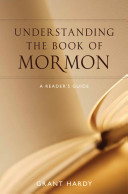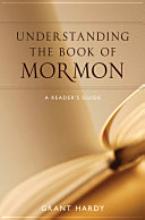Category: Cornucopia
-
The Deep Subjects of the Book of Mormon, Plato, Zhuangzi, and So On . . .
My friend and co-blogger Rosalynde presents a fascinating argument about Book of Mormon historicity in her recent review of Grant Hardy’s Understanding the Book of Mormon. Based on my experience with various other ancient texts, I respectfully disagree. Rosalynde suggests that Grant Hardy’s literary analysis of the Book of Mormon is harder to separate from…
-

Bootstrapping a Book of Mormon Readership
Compare this classic statement of Richard Bushman, meant to encapsulate his own efforts as part of the New Mormon History movement: As more and more historians work to situate Mormonism in American history, Mormons like me want to join the discussion. We will write better if we are less defensive, more open to criticism, more…
-
Summer Seminar Symposium: The Cultural History of the Gold Plates
Participants in Richard Bushman’s and Terryl Givens’ Summer Seminar on the Gold Plates will be presenting papers tomorrow, Thursday, August 18th, at BYU. Here are the details: The Mormon Scholars Foundation Annual Summer Symposium on Mormon Culture The Cultural History of the Gold Plates Thursday, August 18, 2011 B037 Joseph F. Smith Building Brigham Young…
-

“What the Hell Is Happening in Somalia?” – Part 1
Ghedi, 13 years old, is trying to escape Mogadishu, the capital city of Somalia. Now, before I start Ghedi’s story, let’s get ourselves situated. Here’s Mogadishu relative to the rest of Africa: You can see that it’s a coastal city, on the southern end of the Horn of Africa (that’s the pokey piece of Africa…
-
Grant Hardy’s Subject Problem
Criticisms of the Book of Mormon generally fall into one of two categories: objections to its historical claims on the one hand, and on the other critiques of its literary style. The two prongs are often combined in a single attack, for instance in the suggestion that the awkward style of the book reflects the…
-
A Review of Grant Hardy’s Understanding the Book of Mormon
In On the Road with Joseph Smith: An Author’s Diary, we get a fascinating peek into Richard Bushman’s psyche during the time immediately after the publication of his monumental work, Joseph Smith: Rough Stone Rolling.
-

Grant Hardy Week at Times & Seasons
Times and Seasons is excited this week to present to you a roundtable series review of Grant Hardy’s recent book Understanding the Book of Mormon: A Reader’s Guide (Oxford 2010). The upcoming posts will not only acquaint you with book itself, but also provide our opinionated responses, and of course, allow you all to join…
-
Belief
I know a lot of people swear by it, but I’ve never found “belief” to be a reliable way of describing what is (or isn’t) happening when I plant myself in a pew.
-
The Conference Showdown: Ward, Stake, or General?
It’s ward conference for us today. Ward conference is kind of a let-down for me. It doesn’t offer the short church session that we get from stake conference, and I can’t watch it on my laptop while eating not-Cap’n-Crunch in my pajamas. It’s pretty much just business-as-usual. But it’s not like the two-hour session of…
-
Sam Brunson Joins Times & Seasons
Times & Seasons is happy to announce that Sam Brunson has agreed to join our happy blogging family as a permanent contributor. For those unfamiliar with Sam, the introductory post on him can be found here and his posts to-date are available here.
-
The Tongues of Mortals
There’s a sidebar called “The Poetic Language of the King James Bible” in the August 2011 Ensign.
-

Scent of a Mormon
The program for the annual convention of the Modern Language Association regularly includes the following request: The Committee on Disability Issues in the Profession reminds attendees that refraining from using perfume, cologne, and other scented products will help ensure the comfort of everyone at the convention.
-
Call Me Uzzah
I just saw Stephen M (Ethesis)’s post on complaints about EFY and I liked his list of reasons people complain (particularly about church stuff). For those of you who aren’t clicking the link to his article, here’s the quick summary of his list: Legitimate — Complaining about a demonstrable problem with a demonstrable solution. Compulsive…
-
Rhetoric v. Practice
By the time I was, say, 15, my hair was long. Not long-for-a-good-Mormon-boy, but legitimately long. (Also, I listened to heavy metal and grunge–there may have been a causal relationship there, but I’m not sure which way it ran.) Both my music and my hair probably violated the Church’s rhetorical standards.[fn1] That is, per statements…
-
Things I’m Banning
Quoting from Monty Python. Sorry, it’s just not funny when I hear you do it. This applies double to anything about being turned into a newt and getting better. Same goes for Princess Bride. Yes, it’s quite possibly the greatest movie ever made, but I don’t care that you can recite the whole thing word for…
-
A Primer on Mormon Prayer: Duration
Say that you want to pray. Say that you want to make prayer the center of your life rather than just an aid to it. Say that you want to take up prayer as an end in itself. Say that you understand prayer to be the formal practice of submitting your will to God’s. And…
-
Grant Hardy at Meridian
So I haven’t exactly been a fan of Meridian, but lately they have been running some very innovative stuff from Grant Hardy; see here and here. And I suppose you can discuss his essays in the comments here, if you play nice.
-
Loosely Coupled – An n-tier Religion
One goal in computer programming is to build “loosely coupled” systems. A loosely coupled system isn’t tied down to a specific platform. It makes it easy to take a program written for Macintosh and turn it into a program that can run on Windows or Linux or whatever other system you want. When a new…
-
Borrowing and Betraying Culture
NPR did a piece yesterday evening on a speech school for Brooklyners (Brooklynites? Brookies?) who want to get rid of their accent. These are people who feel that speaking with a Brooklyn accent makes people perceive them poorly, and that it’s holding them back socially or professionally. Predictably, this leads to a kickback from the…
-
My Book of Mormon: The Musical Post
I know I’m totally late to The Book of Mormon: The Musical party. The media has done it to death, the Bloggernacle has discussed it to death, and the Tonys awarded it to death. It’s provide huge amounts of press to the Church and at least one great interview on The Daily Show. I read…
-
A Primer on Mormon Prayer: Contributing
Over at BCC, Kristine opined last week on the subject of Mormon “intellectuals.” After admitting that knowing stuff can, in fact, be helpful, she concluded the following: “But this is the suspicion that was nagging at me during our conversation, and has not left me: intellectual gifts, like most of what we bring to the altar,…
-

Valid Targets and the Muse
In 2001, when I lived in Tracy, California, I attended the tri-stake institute in Stockton, or maybe it was Manteca. The teacher was Pres. Anderson, an amazing CES instructor. (He was transferred out to Utah shortly after I left Tracy… Do any of you know what happened to him, or what he’s up to now?)…
-
Remember the name
What is the name of the church? (Pick up to three options). Try not to google it first. [poll id=”4″]
-
CNN blog reports from anti-Mormon Bizarro-Land
The CNN blog just ran a lengthy interview with Tricia Erickson, who makes a variety of arguments that no believing Mormon should ever be elected President. (Link here; note that in her interview she cites language from the endowment ceremony). Erickson’s arguments are predictably bad. She repeats the old evangelical anti-Mormon reasoning that Mormons are…
-
A Primer on Mormon Prayer: Aligning
What exactly is it that you are trying to practice when you practice prayer? In particular, what exactly is it that you are trying to practice when you practice prayer as an end in itself rather than as a means to some other end? I take two things as axiomatic with respect to the practice of prayer.
-
King Noah and Burdensome Taxes
A strain of popular Mormon thought appears to hold that a significant message derived from the story of King Noah is that taxes in excess of 20% are per se immoral, and drawing whatever inevitable conclusion follows from the current U.S. marginal tax rates. [fn1] It’s a fair application, I guess, of Nephi’s apply-the-scriptures-to-ourselves philosophy.…
-
A Primer on Mormon Prayer: Deciding
Prayer can be approached as a means or as an end. You’re tired of using God as a crutch to get wherever else you want to go and finally decide, throwing it all over, to just make God your explicit destination. Consecration it is. The kingdom of God or nothing.
-
The Bonds That Tie
Sometime while I was in the MTC, I started a list of things that were cool and that I didn’t want my mission to make me forget or turn my back on. I wrote things down on a loose sheet of paper that I kept, folded, in my journal. I’d love to see it now,…
-
A Celestial Education?
Michelle Stone’s “Celestial Education” philosophy is seriously misguided and theologically dangerous.
-
A Primer on Mormon Prayer: Abiding
You know the feeling: you’re hungry for God. Your soul, restless, can find no rest. Your pillow’s warm on both sides.
